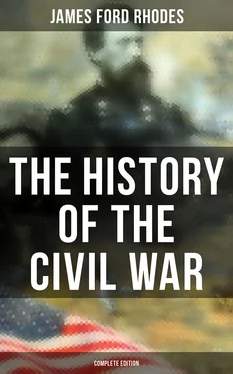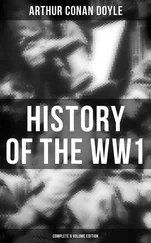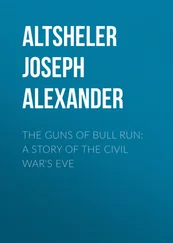James Ford Rhodes - The History of the Civil War (Complete Edition)
Здесь есть возможность читать онлайн «James Ford Rhodes - The History of the Civil War (Complete Edition)» — ознакомительный отрывок электронной книги совершенно бесплатно, а после прочтения отрывка купить полную версию. В некоторых случаях можно слушать аудио, скачать через торрент в формате fb2 и присутствует краткое содержание. Жанр: unrecognised, на английском языке. Описание произведения, (предисловие) а так же отзывы посетителей доступны на портале библиотеки ЛибКат.
- Название:The History of the Civil War (Complete Edition)
- Автор:
- Жанр:
- Год:неизвестен
- ISBN:нет данных
- Рейтинг книги:5 / 5. Голосов: 1
-
Избранное:Добавить в избранное
- Отзывы:
-
Ваша оценка:
- 100
- 1
- 2
- 3
- 4
- 5
The History of the Civil War (Complete Edition): краткое содержание, описание и аннотация
Предлагаем к чтению аннотацию, описание, краткое содержание или предисловие (зависит от того, что написал сам автор книги «The History of the Civil War (Complete Edition)»). Если вы не нашли необходимую информацию о книге — напишите в комментариях, мы постараемся отыскать её.
This Pulitzer Prize winning book remains one of the best histories on the topic of American Civil War to this day. For the purpose of writing this comprehensive work, the author used the most authoritative documents and sources including Personal Traits of Lincoln, Life and Letters of General Meade, Diary of Gideon Welles, The Reminiscences of Carl Schurz and Official Records of the Union and Confederate Navies.
The History of the Civil War (Complete Edition) — читать онлайн ознакомительный отрывок
Ниже представлен текст книги, разбитый по страницам. Система сохранения места последней прочитанной страницы, позволяет с удобством читать онлайн бесплатно книгу «The History of the Civil War (Complete Edition)», без необходимости каждый раз заново искать на чём Вы остановились. Поставьте закладку, и сможете в любой момент перейти на страницу, на которой закончили чтение.
Интервал:
Закладка:
An official report of July 1 gives the strength of the Union army as 186,000. 92The newspapers, especially the New York Tribune, had already been clamoring for an advance on Richmond. General Scott was urged not to lose the services of the three-months men whose time would soon expire. 93Politicians, fearing the effect of delay on public sentiment, supported this demand; and men of experience and good judgment joined in the popular cry. As early as May Governor Andrew complained "of the want of vigor," in the Northern operations and Senator Fessenden wrote, "I am hoping every day to hear of some decided blow." 94William H. Russell, basing his opinion on the European standard, with which his experience in the Crimea had made him familiar, gave an account of the wretched condition of the Union soldiers in camps near Washington, whose number, available for a campaign, he estimated at 30,000. "I am opposed to national boasting," he wrote, "but I do firmly believe that 10,000 British regulars (then apparently thinking he must say something for England's ally) or 12,000 French with a proper establishment of artillery and cavalry, under competent commanders, would not only entirely repulse this army with the greatest ease but that they could attack them and march into Washington, over them or with them, whenever they pleased." 95
The popular cry "On to Richmond" was dinned in the President's ears until he yielded to the opinion, that the Union army force a battle in eastern Virginia. A victory would maintain the unanimity of feeling that had prevailed since the firing on Sumter; it would be the earnest of a short war. With a short war in prospect patriotism would continue at its present high beat and such dissensions as might issue in an opposition party would not arise. Moreover, the good will of Europe would be preserved. Europe was now in sympathy with the President's assertion of the national authority, but it would be well to let her perceive that the United States government, to which she sent her envoys, had the stronger battalions. Furthermore, if the excellent men, who had volunteered for three months, were to be used at all in active service, they must soon take the field, as their term of enlistment was fast drawing to a close. Having taken all these considerations into account, the President called a number of generals in council with his Cabinet. McDowell, a graduate of West Point, a staff-officer during the Mexican war, and the present commander of the troops on the Virginia side of the Potomac, said that he would move against Beauregard, who had a force of 21,900 behind the stream called Bull Run, provided that Joseph E. Johnston, who was in the Shenandoah valley with 9000, could be prevented from joining Beauregard. General Scott, who felt that the army was in no condition to fight a battle in Virginia but who had deferred to the President's wish, said, "If Johnston joins Beauregard he shall have Patterson on his heels." Patterson with 18,000 to 22,000 was depended upon to keep a sharp watch on Johnston and had been instructed to beat him or detain him in the valley.
On the afternoon of July 16 McDowell's "Grand Army," about 30,000 strong and composed, for the most part of three months' volunteers supported by 1600 regulars, marched to the front and on the 18th occupied Centreville. No living American general had ever commanded so large a body of men, and McDowell's experience as staff-officer in Mexico had been with a much smaller number. Excepting the regulars, the troops were raw as were likewise most of their officers; and this march of twenty-seven miles, which a year later would have been considered a bagatelle, was now a mighty undertaking. There was lack of discipline, wrote William T. Sherman, who commanded a brigade; "with all my personal efforts, I could not prevent the men from straggling for water, blackberries or anything on the way they fancied." The troops did not know how to take care of their rations, "to make them last the time they should," reported McDowell; moreover their excitement "found vent in burning and pillaging." These excesses, however, were checked by McDowell.
Johnston, having received a telegram from Richmond to join Beauregard if practicable, managed to elude Patterson and started for Bull Run at noon of July 18. "The discouragements of that day's march to one accustomed, like myself," he wrote, "to the steady gait of regular soldiers is indescribable." Because of frequent and unreasonable delays and lack of discipline he despaired of reaching Beauregard in time. He accordingly made arrangements for covering the final stage by rail. After a march of twenty-three miles, he and his infantry completed the remaining thirty-four by train; the cavalry and artillery continued on the wagon-road; on Saturday the 20th he had 6000 in union with Beauregard.
McDowell had heard rumors that Johnston had joined Beauregard but he did not credit them; so he went forward with his original plan which was to turn the Confederate left. On Sunday morning, July 21, he attacked. Owing to the inexperience of both officers and men, the delays in marching and manœuvring made the attack three hours late, yet at ten o'clock the Union troops engaged the enemy and, being in superior force, drove him before them. The Confederates were in full retreat, but as they ran up the slope of the plateau about the Henry House, Thomas J. Jackson's brigade stood there calmly awaiting the onset. General Bee cried out in encouragement to his retreating troops, "There is Jackson standing like a stone wall." As "Stonewall" Jackson he was known till the day of his death and ever afterwards.
Patterson had greatly overestimated Johnston's force and feared to make an attack; indeed in his alarm he marched north, directly away from the Confederates instead of following them. Unaware of his actual movement the Confederate generals thought that he would make haste to join McDowell. Beauregard therefore deemed it advisable to attack the Union forces with his right wing and centre before the expected reënforcement came; Johnston, the ranking officer, approved the plan. A miscarriage of orders prevented the movement; at the same time McDowell's attack came as a surprise and it was the sound of cannon that first told them he was trying to turn their left. It was four miles to the scene of action but Johnston and Beauregard rode thither as fast as their horses would carry them. "We came not a moment too soon," said Johnston. The Confederates were demoralized; a disorderly retreat had begun; and it needed all the firmness and courage of the commanding generals to stem the tide. Beauregard remained in the thick of the fight, in command of the troops there engaged, while Johnston rode regretfully to the rear to hurry forward reënforcements.
It was high noon when the two Confederate generals appeared on the field. The battle lasted until three. The hottest fighting was for the possession of the Henry plateau which the Union troops had seized. At two o'clock Beauregard gave the order to advance to recover the plateau. The charge was made with spirit. Jackson's brigade pierced the Union centre at the bayonet's point; the other troops moved forward with equal vigor, broke the Union lines and swept them back from the open ground of the plateau. The Union troops rallied, recovered their ground and drove the Confederates from the plateau into the woods beyond. McDowell, who had this part of the field immediately under his own eye, thought this last repulse final and that the day was his.
Jefferson Davis, too anxious to remain in Richmond, went by rail to the scene of action. As he approached Manassas railroad junction he saw a cloud of dust raised by wagons that had been sent to the rear and heard distinctly the sound of firing. At the junction were a large number of men who had left the field in panic and who now gave Davis graphic accounts of the defeat of the army. He asked a gray-bearded man whose calm face and composed demeanor inspired confidence, how the battle had gone? "Our line was broken," came the reply; "all was confusion, the army routed and the battle lost." The conductor of the train refused to go farther but, on Davis's stern insistence, detached the locomotive and ran it to the headquarters, where Davis found horses for himself and his aide; two officers guided him thence toward the battle-field. On the way, he met a large number of stragglers and received frequent warnings that there was danger ahead; but the sound of firing was now fainter, which seemed to indicate both an advance of the Confederates and a waning of the battle. Meeting Johnston on a hill overlooking the field, he might in his question have used the words of Henry V at Agincourt, "I know not if the day be ours or no?" when Johnston at once assured him, "that we had won the battle."
Читать дальшеИнтервал:
Закладка:
Похожие книги на «The History of the Civil War (Complete Edition)»
Представляем Вашему вниманию похожие книги на «The History of the Civil War (Complete Edition)» списком для выбора. Мы отобрали схожую по названию и смыслу литературу в надежде предоставить читателям больше вариантов отыскать новые, интересные, ещё непрочитанные произведения.
Обсуждение, отзывы о книге «The History of the Civil War (Complete Edition)» и просто собственные мнения читателей. Оставьте ваши комментарии, напишите, что Вы думаете о произведении, его смысле или главных героях. Укажите что конкретно понравилось, а что нет, и почему Вы так считаете.












